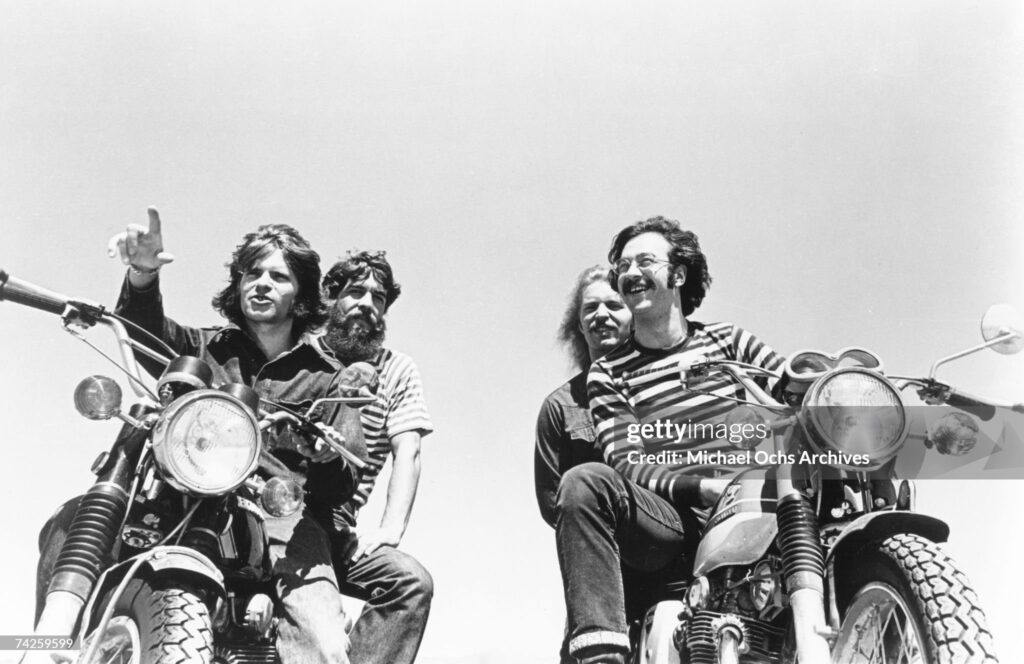
A warning whispered through distortion, “Run Through the Jungle” is Creedence Clearwater Revival sounding the alarm—not about distant battlefields, but about fear spreading quietly at home.
When Creedence Clearwater Revival released “Run Through the Jungle” in 1970, it arrived paired with “Up Around the Bend” on the same single—two songs sharing one piece of vinyl, yet carrying very different emotional weather. Together, that release climbed to #4 on the Billboard Hot 100, confirming CCR’s extraordinary ability to speak to the moment while remaining musically direct and unmistakably themselves. Soon after, “Run Through the Jungle” took its place on Cosmo’s Factory (released July 1970), the album that would go on to reach #1 on the Billboard 200 and remain there for nine consecutive weeks. Commercial success surrounded the song—but its message was anything but celebratory.
Written by John Fogerty, “Run Through the Jungle” is one of CCR’s most misunderstood tracks. On first listen, many assumed it was a Vietnam War song—its title alone seems to invite that conclusion. Fogerty later clarified that the “jungle” here was not Southeast Asia, but America itself. The song was inspired by his growing unease with the proliferation of firearms and the creeping sense that violence was no longer distant or abstract—it was becoming woven into everyday life.
That distinction matters, because it changes how the song feels.
This is not a protest song aimed outward. It’s a warning aimed inward. Fogerty paints a world where danger is no longer announced by uniforms or borders, but hidden in shadows, carried casually, normalized. The lyric’s tension comes from uncertainty rather than confrontation. You don’t know where the threat is coming from—and that’s exactly the point.
Musically, “Run Through the Jungle” is built on unease. The rhythm trudges forward with a heavy, almost claustrophobic gait. Fogerty’s guitar tone is murky and menacing, layered with echo and distortion that feel less like ornament and more like atmosphere. The sound suggests something closing in rather than opening up. There’s no release, no soaring chorus meant to comfort. The song moves relentlessly, like footsteps you can’t quite locate.
Fogerty’s vocal delivery deepens that anxiety. He doesn’t shout warnings; he states them. His voice sounds wary, alert, as if he’s already seen what’s coming and knows how little good it will do to raise his voice now. Lines about hearing thunder without rain and watching the “devil” on the loose carry a sense of inevitability. This isn’t hysteria. It’s recognition.
The meaning of “Run Through the Jungle” grows heavier with time. What felt like a commentary on the late 1960s and early 1970s—an era marked by unrest, mistrust, and armed fear—has continued to echo across decades. The song doesn’t rely on specific references or slogans, which is why it keeps resurfacing whenever society feels on edge. The “jungle” becomes a metaphor for any environment where caution replaces trust, where survival instincts begin to outweigh communal bonds.
Within Cosmo’s Factory, the song serves as a dark counterweight. The album is often remembered for its momentum—tight performances, confident movement, a sense of mastery. “Run Through the Jungle” interrupts that flow with something more unsettling. It forces the listener to slow down, to listen more carefully, to feel the weight beneath the motion. It reminds us that speed and success do not erase underlying danger.
What makes Creedence Clearwater Revival so enduring is their refusal to dress hard truths in abstraction. Fogerty didn’t hide behind poetic vagueness. He chose a metaphor everyone could feel, even if they didn’t immediately decode it. The jungle isn’t exotic. It’s familiar. It’s the place you already live, when fear becomes ambient and vigilance feels permanent.
Decades later, “Run Through the Jungle” still doesn’t feel resolved. It doesn’t offer solutions. It doesn’t promise safety. It simply tells you to be aware—to recognize the landscape you’re moving through. And that honesty is what gives the song its lasting power. It doesn’t try to comfort you with certainty. It respects you enough to tell you the truth as it sees it.
In the end, “Run Through the Jungle” is not about escape.
It’s about awareness.
About understanding that danger doesn’t always announce itself—
sometimes it waits quietly, blending into the trees,
until you realize you’ve been walking through it all along.